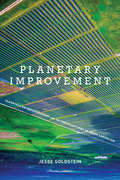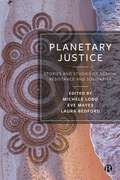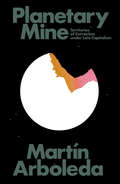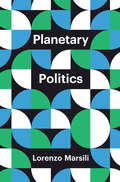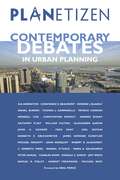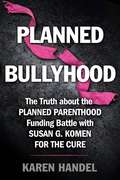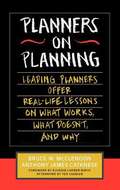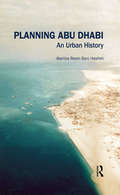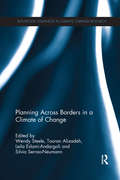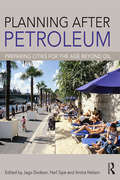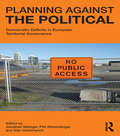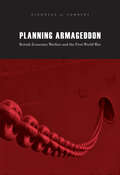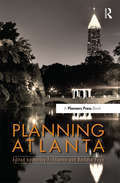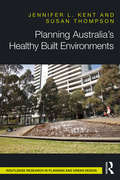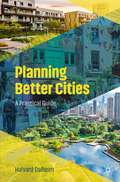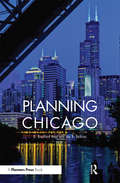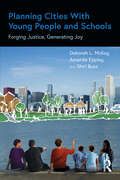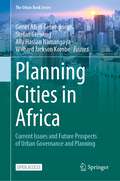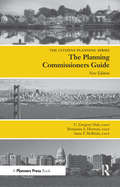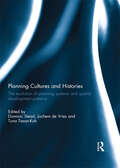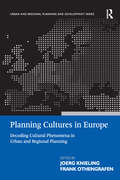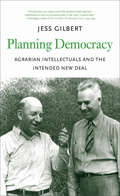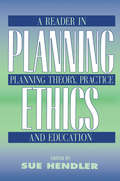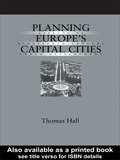- Table View
- List View
Planetary Improvement: Cleantech Entrepreneurship and the Contradictions of Green Capitalism (The\mit Press Ser.)
by Jesse GoldsteinAn examination of clean technology entrepreneurship finds that “green capitalism” is more capitalist than green.Entrepreneurs and investors in the green economy have encouraged a vision of addressing climate change with new technologies. In Planetary Improvement, Jesse Goldstein examines the cleantech entrepreneurial community in order to understand the limitations of environmental transformation within a capitalist system. Reporting on a series of investment pitches by cleantech entrepreneurs in New York City, Goldstein describes investor-friendly visions of incremental improvements to the industrial status quo that are hardly transformational. He explores a new “green spirit of capitalism,” a discourse of planetary improvement, that aims to “save the planet” by looking for “non-disruptive disruptions,” technologies that deliver “solutions” without changing much of what causes the underlying problems in the first place.Goldstein charts the rise of business environmentalism over the last half of the twentieth century and examines cleantech's unspoken assumptions of continuing cheap and abundant energy. Recounting the sometimes conflicting motivations of cleantech entrepreneurs and investors, he argues that the cleantech innovation ecosystem and its Schumpetarian dynamic of creative destruction are built around attempts to control creativity by demanding that transformational aspirations give way to short-term financial concerns. As a result, capitalist imperatives capture and stifle visions of sociotechnical possibility and transformation. Finally, he calls for a green spirit that goes beyond capitalism, in which sociotechnical experimentation is able to break free from the narrow bonds and relative privilege of cleantech entrepreneurs and the investors that control their fate.
Planetary Justice: Stories and Studies of Action, Resistance and Solidarity
by Michele LoboAvailable open access digitally under CC-BY-NC-ND licence. Bringing together interdisciplinary climate change scholarship and grassroots activism, this book considers the possibilities of planetary justice across human difference, generations, species and the concept of life and non-life. Writing amidst bushfires, cyclones, global climate strikes and a global pandemic, contributors from the Earth Unbound Collective share stories from India, Australia, Canada and Scotland. Chapters draw on Indigenous, Black, Southern, ecosocialist and ecofeminist perspectives to call for more radical and interconnected ideas of justice and solidarity. This accessible book features diverse voices that speak with the planet in the face of climate change, biodiversity loss and extinction. It explores the politics and practices of working towards a future where the planet thrives.
Planetary Mine: Territories of Extraction under Late Capitalism
by Martin ArboledaA clarion call to rethink natural resource extraction beyond the extractive industriesPlanetary Mine rethinks the politics and territoriality of resource extraction, especially as the mining industry becomes reorganized in the form of logistical networks, and East Asian economies emerge as the new pivot of the capitalist world-system. Through an exploration of the ways in which mines in the Atacama Desert of Chile—the driest in the world—have become intermingled with an expanding constellation of megacities, ports, banks, and factories across East Asia, the book rethinks uneven geographical development in the era of supply chain capitalism. Arguing that extraction entails much more than the mere spatiality of mine shafts and pits, Planetary Mine points towards the expanding webs of infrastructure, of labor, of finance, and of struggle, that drive resource-based industries in the twenty-first century.
Planetary Politics: A Manifesto (Theory Redux)
by Lorenzo MarsiliThe global crisis of our time involves a complex of ecological, economic, technological and migratory challenges that no state is able to control. The result is a provincialisation of our democracies with respect to the new planetary powers confronting humanity. It is from this that our increasingly impotent and rabid politics stems. Paradoxical as it may seem, it is precisely the decline of the nation-state that is the source of the great nationalist uprising of our time.We need a new planetary vision that is able to reclaim and liberate our world, starting today and engaging each of us. This is the task of philosophy as much as it is of politics, of theory as it is of activism. Connecting with a new generation taking to the streets across the globe, this book tells the story of the ever-closer union of our world, from the age of empire to the climate crisis, and presents a plea and a roadmap to step beyond the mental and material boundaries of our nations.
Planetizen's Contemporary Debates in Urban Planning
by Abhijeet Chavan Christian Peralta Christopher Steins Abhijeet PlanetizenPlanetizen's Contemporary Debates in Urban Planning is a fascinating review of major topics and issues discussed in the field of urban planning, assembled by editors at Planetizen, the leading source of news and information for the planning and development community on the web. The book brings together a wide range of editorial and discussion topics, coupled with commentary and overviews to create an enlightening record of the continuously evolving philosophy of building and managing cities. The book's contributors include the most well-known experts in the planning and design fields, among them James Howard Kunstler, Alex Garvin, Andres Duany, Joel Kotkin, and Wendell Cox. These and other prominent thinkers offer passionate debates and thought-provoking commentary on the most important and controversial topics in the field of urban planning and design: gentrification, eminent domain, the philosophical divide between the Smart Growth community, libertarians and New Urbanists, regional growth patterns, urban design trends, transportation systems, and reaction to disasters such as Katrina and 9/11 that changed the way we look at cities and security. Planetizen's Contemporary Debates in Urban Planning provides readers with a unique and accessible introduction to a broad array of ideas and perspectives. With the increasing awareness of the need for sound urban planning to ensure the economic, environmental, and social health of modern society, Planetizen's Contemporary Debates in Urban Planning gives professionals in the field and concerned citizens alike a deeper understanding of the critical, complex issues that continue to challenge urban planners, designers, and developers.
Planned Bullyhood
by Karen HandelThe full, up-close story of the battle between Susan G. Komen for the Cure and Planned Parenthood from the woman at the center of the explosive media firestorm of early 2012, Karen Handel, former SVP of Public Policy at Komen.
Planner's Estimating Guide: Projecting Land-Use and Facility Needs
by Arthur NelsonThe United States faces enormous changes in the next 25 years. Arthur C. (Chris) Nelson starts this book with a few projections: The population will grow by one-third to 375 million. We will need 60 million new housing units to house these people. There will be 60 percent more jobs, requiring 50 billion additional square feet of nonresidential space. The bottom line is that half of all development in 2030 will have been built since 2000. Nelson estimates the cost of new construction alone to be at least $20 trillion. This book gives planning practitioners a powerful tool to help decide where to put this new development. It does not advocate one development scenario over another, but it revolutionizes the job of estimating land-use and facility needs. Planner's Estimating Guide offers easy-to-use formulas and worksheets that are formatted in an Excel workbook on CD-ROM and carefully explained in the text. They make it easy to figure future requirements for countless scenarios. The workbook and text deal with a 20-year planning horizon for a fictitious county, but both the time projection and scale are entirely adaptable to myriad local circumstances. The program allows you to gather a first impression of future land-use needs, and revise it to reflect local limitations. For example, if the landscape in question won't support the land-use estimations, change the assumptions in the workbook to devise new estimates. The workbook shows the implications of growth based on standard assumptions; you can change the assumptions as needed to reflect local conditions — including public input — to see how outcomes change. Use the workbook as a model for testing local sensitivities with respect to land supply constraints and changes in policy assumptions. The results won't tell you what to do, but will reveal the numerical implications of different scenarios. The book is written principally for practitioners, and also for planning students as a primary or supplementary text. Used creatively, the powerful tools in Planner's Estimating Guide will help you determine the numerical implications of an almost infinite number of future circumstances that may affect your community.
Planners On Planning: Leading Planners Offer Real-life Lessons On What Works, What Doesn't, and Why
by Bruce W. McClendon Anthony James CataneseOffers pragmatic information on the realities of day-to-day practice from some of the most innovative, respected, and visionary leaders in the planning profession today. Bridging the gap between theory and practice, this guide provides straightforward lessons from today′s most effective planners on the core values, skills, and techniques needed for success. Through personal, real-life examples from the trenches, these experts explain in their own words what works, what doesn′t, and why.
Planning Abu Dhabi: An Urban History (Planning, History and Environment Series)
by Alamira Reem Bani HashimAbu Dhabi’s urban development path contrasts sharply with its exuberant neighbour, Dubai. As Alamira Reem puts it, Abu Dhabi, capital of the United Arab Emirates since 1971, ‘has been quietly devising its own plans … to manifest its role and stature as a capital city’. Alamira Reem, a native Abu Dhabian and urban planner and researcher who has studied the emirate’s development for more than a decade, is uniquely placed to write its urban history. Following the introduction and description of Abu Dhabi’s early modern history, she focuses on three distinct periods dating from the discovery of oil in 1960, and coinciding with periods in power of the three rulers since then: Sheikh Shakhbut bin Sultan Al Nahyan (1960–1966), Sheikh Zayed bin Sultan Al Nahyan (1966–2004), and Sheikh Khalifa bin Zayed Al Nahyan (2004–). Based on archival research, key interviews and spatial mapping, she analyses the different approaches of each ruler to development; investigates the role of planning consultants, architects, developers, construction companies and government agencies; examines the emergence of comprehensive development plans and the policies underlying them; and assesses the effects of these many and varied influences on Abu Dhabi’s development. She concludes that, while much still needs to be done, Abu Dhabi’s progress towards becoming a global, sustainable city provides lessons for cities elsewhere.
Planning Across Borders in a Climate of Change (Routledge Advances in Climate Change Research)
by Wendy Steele Silvia Serrao-Neumann Tooran Alizadeh Leila Eslami-AndargoliThe fixity or mobility of borders are key themes within the border studies literature and have useful critical application to urban and environmental planning through theory, pedagogy and practice. This offers potential for transformative change through the processes of re-bordering and re-orienting established boundary demarcations in ways that support and promote sustainability in a climate of change. Planning Across Borders in a Climate of Change draws on a range of diverse case studies from Australasia, North and South America, Europe, Africa, the Middle East and Asia and offers the application of border theory, concepts and principles to planning as a critical lens. It applies this lens to a range of international case studies in key areas such as climate change adaptation, food security, spatial planning, critical infrastructure and urban ecology. This collection fills an important gap in the border studies literature, bringing climate change considerations to bear on planning. It should be of interest to students, scholars and professionals in the field of urban and environmental planning, climate change adaptation, border studies, urban studies, human and political geography, environmental studies and development.
Planning After Petroleum: Preparing Cities for the Age Beyond Oil
by Neil Sipe Jago Dodson Anitra NelsonThe past decade has been one of the most volatile periods in global petroleum markets in living memory, and future oil supply security and price levels remain highly uncertain. This poses many questions for the professional activities of planners and urbanists because contemporary cities are highly dependent on petroleum as a transport fuel. How will oil dependent cities respond, and adapt to, the changing pattern of petroleum supplies? What key strategies should planners and policy makers implement in petroleum vulnerable cities to address the challenges of moving beyond oil? How might a shift away from petroleum provide opportunities to improve or remake cities for the economic, social and environmental imperatives of twenty-first-century sustainability? Such questions are the focus of contributors to this book with perspectives ranging across the planning challenge: overarching petroleum futures, governance, transition and climate change questions, the role of various urban transport nodes and household responses, ways of measuring oil vulnerability, and the effects on telecommunications, ports and other urban infrastructure. This comprehensive volume – with contributions from and focusing on cities in Australia, the UK, the US, France, Germany, the Netherlands and South Korea – provides key insights to enable cities to plan for the age beyond petroleum.
Planning Against the Political: Democratic Deficits in European Territorial Governance
by Philip Allmendinger Stijn Oosterlynck Jonathan MetzgerThis book brings together a number of highly innovative and thought provoking contributions from European researchers in territorial governance-related fields such as human geography, planning studies, sociology, and management studies. The contributions share the ambition of highlighting troubling contemporary tendencies where spatial planning and territorial governance can be seen to circumscribe or subvert ‘due democratic practice’ and the democratic ethos. The book also functions as an introduction to some of the central strands of contemporary political philosophy, discussing their relevance for the wider field of planning studies and the development of new planning practices.
Planning Armageddon: British Economic Warfare and the First World War
by Nicholas A. LambertBefore the First World War, the British Admiralty conceived a plan to win rapid victory in the event of war with Germany-economic warfare on an unprecedented scale.This secret strategy called for the state to exploit Britain's effective monopolies in banking, communications, and shipping-the essential infrastructure underpinning global trade-to create a controlled implosion of the world economic system. In this revisionist account, Nicholas Lambert shows in lively detail how naval planners persuaded the British political leadership that systematic disruption of the global economy could bring about German military paralysis. After the outbreak of hostilities, the government shied away from full implementation upon realizing the extent of likely collateral damage-political, social, economic, and diplomatic-to both Britain and neutral countries. Woodrow Wilson in particular bristled at British restrictions on trade. A new, less disruptive approach to economic coercion was hastily improvised. The result was the blockade, ostensibly intended to starve Germany. It proved largely ineffective because of the massive political influence of economic interests on national ambitions and the continued interdependencies of all countries upon the smooth functioning of the global trading system. Lambert's interpretation entirely overturns the conventional understanding of British strategy in the early part of the First World War and underscores the importance in any analysis of strategic policy of understanding Clausewitz's "political conditions of war."
Planning Atlanta
by Harley F. Etienne Barbara FagaMore than any other major U.S. city, Atlanta regularly reinvents itself. From the Civil War’s devastation to the 1996 Olympic boom to the current housing crisis, the city’s history is a cycle of rise and fall, ruin and resurgence. In Planning Atlanta, two dozen planning practitioners and thought leaders bring the story to life. Together they trace the development of projects like Freedom Parkway and the Jimmy Carter Presidential Library. They examine the impacts of race relations on planning and policy. They explore Atlanta’s role as a 19th-century rail hub—and as the home of the world’s busiest airport. They probe the city’s economic and environmental growing pains. And they look toward new plans that will shape Atlanta’s next incarnation. Read Planning Atlanta and discover a city where change is always in the wind.
Planning Australia’s Healthy Built Environments
by Susan Thompson Jennifer L. KentPlanning Australia’s Healthy Built Environments shines a quintessentially Australian light on the links between land use planning and human health. A burgeoning body of empirical research demonstrates the ways urban structure and governance influences human health—and Australia is playing a pivotal role in developing understandings of the relationships between health and the built environment. This book takes a retrospective look at many of the challenges faced in pushing the healthy built environment agenda forward. It provides a clear and theoretically sound framework to inform this work into the future. With an emphasis on context and the pursuit of equity, Jennifer L. Kent and Susan Thompson supply specific ways to better incorporate idiosyncrasies of place and culture into urban planning interventions for health promotion. By chronicling the ways health and the built environment scholarship and practice can work together, Planning Australia’s Healthy Built Environments enters into new theoretical and practical debates in this critically important area of research. This book will resonate with both health and built environment scholars and practitioners working to create sustainable and health-supportive urban environments.
Planning Better Cities: A Practical Guide
by Halvard DalheimThis textbook provides an accessible, practical guide to the strategic planning process required for the preparation of city plans from entire metropolitan areas to town centres. It fills a gap in the academic literature on the topic of strategic planning. Its conceptual and practical content together with a student friendly style and high use of practical examples make it accessible to both the student and recent graduate. Its presentation in three parts allows the reader or course leader to access those sections relevant to either their learning requirements or day-to-day work activities. The book is clearly structured into three-parts and provides flexibility in approach and learning for students taking relevant planning courses. The extensive reading list at the conclusion of each chapter provides the student with an opportunity to explore in more detail the individual topics. The practical approach equips the recent graduate with a deeper understanding of the purpose of each element of strategic planning from how to prepare a research brief to how to approach community engagement activities.
Planning Chicago
by D. Bradford Hunt Jon B DeVriesIn this volume the authors tell the real stories of the planners, politicians, and everyday people who shaped contemporary Chicago, starting in 1958, early in the Richard J. Daley era. Over the ensuing decades, planning did much to develop the Loop, protect Chicago’s famous lakefront, and encourage industrial growth and neighborhood development in the face of national trends that savaged other cities. But planning also failed some of Chicago’s communities and did too little for others. The Second City is no longer defined by its past and its myths but by the nature of its emerging postindustrial future. This volume looks beyond Burnham’s giant shadow to see the sprawl and scramble of a city always on the make. This isn’t the way other history books tell the story. But it’s the Chicago way.
Planning Cities With Young People and Schools: Forging Justice, Generating Joy
by Deborah L. McKoy Amanda Eppley Shirl BussOffering the overlooked but essential viewpoint of young people from low-income communities of color and their public schools, Planning Cities With Young People and Schools offers an urgently needed set of best-practice recommendations for urban planners to change the status quo and reimagine the future of our cities for and with young people. Working with more than 10,000 students over two decades from the San Francisco Bay Area, to New York, to Tohoku, Japan, this work produces a wealth of insights on issues ranging from environmental planning, housing, transportation, regional planning, and urban education. Part I presents a theory of change for planning more equitable, youth-friendly cities by cultivating intergenerational communities of practice where young people work alongside city planners and adult professionals. Part II explores youth engagement in resilience, housing, and transportation planning through an analysis of literature and international examples of engaging children and youth in city planning. Part III speaks directly to practitioners, scholars, and students alike, presenting "Six Essentials for Planning Just and Joyful Cities" as necessary precursors to effective city planning with and for our most marginalized, children, youth, and public schools. For academics, policy makers, and practitioners, this book raises the importance of education systems and young people as critical to urban planning and the future of our cities.
Planning Cities in Africa: Current Issues and Future Prospects of Urban Governance and Planning (The Urban Book Series)
by Stefan Greiving Genet Alem Gebregiorgis Ally Hassan Namangaya Wilbard Jackson KombeThis open access book provides insights into challenges, threats and opportunities of urban development in Africa. It discusses how and why African cities need localised urban planning concepts and theories to deal with challenges and threats of rapid urbanisation and climate change. The book delivers an in-depth view of the nature and gaps of the framework on which current planning practice and education in Africa are based. With that, it discusses the potentials of African cities to mobilise local knowledge, resources and capacity building for sustained and resilient urban growth.This work is addressed to educationists and practitioners in the field of urban development management, climate change adaptation and urban resilience. Specifically, such audiences include researchers, spatial planners, graduate students and member of civil societies working on urban development management.
Planning Commissioners Guide: Processes for Reasoning Together
by C Gregory Dale Benjamin A Herman Anne McBrideAcross the country, communities rely on their planning commissions for guidance. But who guides the planning commissioners? This step-by-step guidebook gets new commissioners off on the right foot and helps experienced commission members navigate their roles. The authors, all practicing planners, have worked extensively with planning commissions for decades. They have watched commissioners scramble up a steep learning curve, sit in the hot seat of controversy, and strive to make sound decisions for the places they call home. In this helpful handbook, the authors share ideas, insights, and information to help commissioners succeed. Eight detailed chapters cover everything from the nuts and bolts of development applications to the nuances of legal issues to the part commissioners play in long-range planning. Readers will learn how to prepare for their first commission meeting, review a development plan, invite productive public input, and steer clear of ethical dilemmas. Added resources include a glossary of planning terms, a list of training resources, and the American Planning Association’s Statement of Ethical Principles in Planning. For anyone serving on a planning commission, The Planning Commissioners Guide is essential reading.
Planning Cultures and Histories: The evolution of Planning Systems and Spatial Development Patterns
by Dominic Stead, Jochem de Vries and Tuna Tasan-KokThis book addresses the influences of planning cultures and histories on the temporal evolution of planning systems and spatial development. As well as providing an international comparative perspective on these issues, the contributions to the book also engage in a search for new conceptual frameworks and alternative points of view to better understand and explain these differences. The book makes three main academic contributions. First, it catalogues some of the key changes in planning systems and the impact on spatial development patterns. Second, it examines the interrelationship between planning cultures and histories from a path-dependency perspective. Third, it discusses the variations in physical development patterns resulting from different planning cultures and histories. Chapters from different parts of the European continent present evidence at different scales to illustrate these aspects. In all cases, the specific combinations of political, ideological, social, economic and technological factors are important determinants of urban and regional planning trajectories as well as spatial development patterns. This book was previously published as a special issue of European Planning Studies.
Planning Cultures in Europe: Decoding Cultural Phenomena in Urban and Regional Planning (Urban and Regional Planning and Development Series)
by Frank OthengrafenBringing together an interdisciplinary team from across the EU, this book connects elements of cultural and planning theories to explain differences and peculiarities among EU member states. A 'culturized planning model' is introduced to consider the 'rules of the game': how culture affects planning practices not only on an explicit 'surface' but also on a 'hidden' implicit level. The model consists of three analytical dimensions: 'planning artifacts', 'planning environment' and 'societal environment'. This book adopts these dimensions to compare planning cultures of different European countries. This sheds light not only on the organizational or institutional structure of planning, but also the influence of deeper cultural values and layers on planning and implementation processes.
Planning Democracy
by Jess GilbertLate in the 1930s, the U. S. Department of Agriculture set up a national network of local organizations that joined farmers with public administrators, adult-educators, and social scientists. The aim was to localize and unify earlier New Deal programs concerning soil conservation, farm production control, tenure security, and other reforms, and by 1941 some 200,000 farm people were involved. Even so, conservative anti-New Dealers killed the successful program the next year. This book reexamines the era's agricultural policy and tells the neglected story of the New Deal agrarian leaders and their visionary ideas about land, democratization, and progressive social change.
Planning Ethics
by Murray StrausOver the past fifty years professional understanding of planning has changed markedly. In the past, planning was primarily described as a technical activity involving data collection, analysis, and synthesis of physical plans and supporting policies. Now planning is seen as a much broader set of human activities, encompassing the physical world and also the realm of public and social services. Not surprisingly, planners' discussions of ethics have evolved. Professional ethics is regarded by many planners to be limited to a set of rules of behavior regarding interactions with the public, sources of data, government officials, and one another.This shift is symbolized by the evolution of the labels by which ethics is known: from a circumscribed view of professional ethics to a broader concept of ethics in planning; both of which are discussed in this book. Sue Hendler argues that planners recognize that every act of planning pursues certain human values and is a series of statements about what we take to be right or wrong and what we take to represent the highest priorities of the society.Planning Ethics explores planning within alternative moral theories, including liberalism, communitarianism, environmentalism, and feminism. The contributors illustrate the application of these ethical principles in specific planning contexts encompassing community development, land conversion, waste management, electric power planning, and education planning. This is the next generation of thinking on ethics and planning. It will be a centerpiece of every planning curriculum.
Planning Europe's Capital Cities: Aspects of Nineteenth-Century Urban Development (Planning, History and Environment Series)
by Thomas HallDuring the nineteenth century many of Europe's capital cities were subject to major expansion and improvement schemes. From Vienna's Ringstrasse to the boulevards of Paris, the townscapes which emerged still shape today's cities and are an inalienable part of European cultural heritage.In Planning Europe's Capital Cities, Thomas Hall examines the planning process in fifteen of those cities and addresses the following questions: when and why did planning begin, and what problems was it meant to solve? who developed the projects, and how, and who made the decisions? what urban ideas are expressed in the projects? what were the legal consequences of the plans, and how did they actually affect subsequent urban development in the individual cities? what similarities or differences can be identified between the various schemes? how have such schemes affected the development of urban planning in general?His detailed analysis shows us that the capital city projects of the nineteenth century were central to the evolution of modern planning and of far greater impact and importance than the urban theories and experiments of the Utopians.
